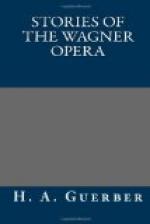Unconscious of all this, Siegmund goes on to relate how on that very day he had fought single-handed against countless foes to defend a helpless maiden, running away only when his weapons had failed him and the maiden had been slain at his feet. Sieglinde listens breathless to the story of his sad life and of his brave defence of helpless virtue, while Hunding suddenly declares that, were it not that the sacred rights of hospitality restrained him, he would then and there slay the man who had made so many of his kinsmen bite the dust. He however contents himself with making an appointment for a hostile encounter early on the morrow, promising to supply Siegmund with a good sword, since he has no weapons of his own:—
’My doors ward thee,
Woelfing, to-day;
Till the dawn shelter they
show;
A flawless sword
Will befit thee at sunrise,
By day be ready for fight,
And pay thy debt for the dead.’
Then Hunding angrily withdraws with his wife, taking his weapons with him, and muttering dark threats, which fill his guest’s heart with nameless fear. Left alone, Siegmund bitterly mourns his lack of weapons, for he fears lest he may be treacherously attacked by his foe, and in his sorrow he reproaches his father, who had repeatedly told him that he would find a sword ready to his hand in case of direst need.
’A sword,—so promised
my father—
In sorest need I should find—
Weaponless falling
In the house of the foe,
Here in pledge
To his wrath I am held.’
While he is brooding thus over his misfortunes, the flames on the hearth flicker and burn brighter. Suddenly their light glints upon the hilt of a sword driven deep in the bole of the mighty oak, and, reassured by the thought that he has a weapon within reach, Siegmund disposes himself to sleep.
The night wears on. The fire flickers and dies out. The deep silence is broken only by Siegmund’s peaceful breathing, when the door noiselessly opens, and Sieglinde, all dressed in white, steals into the room. She glides up to the sleeping guest and gently rouses him, bidding him escape while her husband is still sound asleep under the influence of an opiate which she has secretly administered:—
’It is I; behold what I say!
In heedless sleep is Hunding,
I set him a drink for his
dreams,
The night for thy safety thou
needest.’
Leading him to the oak, she then points out the sword, telling him it was driven into the very heart of the tree by a one-eyed stranger. He had come into the hall on her wedding day, and had declared that none but the mortal for whom the gods intended the weapon would ever be able to pull it out. She then goes on to describe how many strong men have tried to withdraw it, and warmly declares it must have been intended for him who had so generously striven to protect a helpless maiden. Her tender solicitude fills the poor outcast’s famished heart with such love and joy that he clasps her to his breast, and, the door swinging noiselessly open to admit a flood of silvery moonbeams, they join in the marvellous duet known as the ‘Spring Song.’




